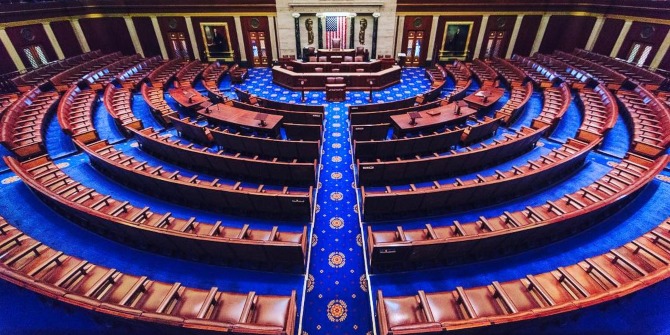

 In the wake of George Floyd’s murder by police in 2020, there has been greater attention on how children learn about race. In new research, Allison Anoll, Andrew Engelhardt and Mackenzie Israel-Trummel examine the effects of the Black Lives Matter protests of 2020 on parents’ attitudes. Through examining parents’ Facebook posts and surveying white parents, they find that awareness of the Black Lives Matter movement promoted new ideas about race in America, and for Democrats, made it more likely they would support resources that increased awareness of racial discrimination.
In the wake of George Floyd’s murder by police in 2020, there has been greater attention on how children learn about race. In new research, Allison Anoll, Andrew Engelhardt and Mackenzie Israel-Trummel examine the effects of the Black Lives Matter protests of 2020 on parents’ attitudes. Through examining parents’ Facebook posts and surveying white parents, they find that awareness of the Black Lives Matter movement promoted new ideas about race in America, and for Democrats, made it more likely they would support resources that increased awareness of racial discrimination.
It was a fast-selling board book for toddlers with mixed reviews, and two years later it was a political prop in a United States Supreme Court confirmation hearing. Brandishing Ibram X. Kendi’s Antiracist Baby, Texas Senator Ted Cruz grilled now-Justice Ketanji Brown-Jackson about her position as a trustee of Georgetown Day School: “This is a book that is taught at Georgetown Day School to students in pre-K through second grade. Do you agree with this book…that babies are racist?” Senator Cruz’s concern with children’s education occurred during a raft of book bans in the United States: PEN America cataloged nearly 6,000 from 2021 through the 2023 school year.
Renewed attention to race education
What’s created all this new attention to children’s education, both inside and outside of schoolhouses, in recent years? Why is race one focal point of this contention?
In new research we show that these debates around child socialization stem from the summer 2020 Black Lives Matter activism following George Floyd’s murder by a white police officer in Minneapolis, Minnesota. Movement activism combined with a pandemic that saw most children in the fulltime care of their parents. This combination of events led many parents to confront new ideas about how to introduce their children to race in their homes. And, when schools began to open back up, movement goals shaped public priorities about school curricula—in both progressive and backlashing directions.
We begin from a simple, well-known premise: children make sense of the world with the help of their parents and other caregivers. Social scientists have long documented a correspondence between what parents believe, what schools teach, and the later attitudes of children and young adults.
But how do parents decide in the first place what to teach their children? How do people build attitudes about school curricula?
One source, we argue, is politics. External actors or events like mass protests or social movements can capture childrearers’ attention, providing tips and tools on how to raise kids in a way that builds a new future consistent with movement aims. But these political influences filter through one’s own predispositions, with partisanship, for instance, differentiating childrearers’ responses.
Examining how Black Lives Matter influenced education about race
We use three different data sources to show that the Black Lives Matter movement influenced caretaker priorities. We start with content from public parenting pages on Facebook. Examining posts made in the three months before and after George Floyd’s murder, we find a sharp increase in discussions about race and policing on these sites. As Figure 1 shows, movement-related ideas are rare before June 2020, but they spike sharply during the protests, before decreasing through the rest of the summer months. Many of these posts are progressive in nature and include specific ideas about how to teach children about race. The movement, it seems, pushed new ideas onto the agenda of parents.
Figure 1 – Posts on public Facebook parenting pages by topic and nature of content

Next, we consider whether people responded to the movement and these changes in the information environment. We surveyed a national sample of white parents of white school-age children in December 2020. As Figure 2 illustrates, we find that 31 percent reported engaging in new in-home activities with their kids related to race. This included: buying or borrowing a book that discussed racial discrimination in America, purchasing new toys, art, or clothes that featured people or characters from a different racial group, and watching certain television shows for their content related to race. Further, 28 percent of parents reported taking on more costly actions, such as attending a Black Lives Matter protest with their child.
Figure 2 – Distribution of parents across action indicators

Democrats and parents with reduced working hours due to the COVID-19 pandemic were more likely to engage in these activities for the first time since May 2020. Living near more peaceful protests also corresponded with greater likelihood of engaging in a costly act for the first time.

“Be The Change” (CC BY-NC-ND 2.0) by risingthermals
Finally, we turned to the effects of the Black Lives Matter movement on school curricula preferences. We ran a survey experiment using an online platform in spring 2022. A diverse sample of US residents were asked to rate the aesthetics and readability of a series of signs. But which signs participants evaluated were randomly assigned. One-third rated signs with the phrase “Big Summer Parade,” another third saw “Vote for Campbell,” and a final third evaluated “Black Lives Matter.” These phrases each raised the importance of certain topics for their viewers. “Vote for Campbell” evokes electoral politics and partisanship; “Black Lives Matter,” the movement and its messages; and “Big Summer Parade,” a, well, big summer parade—which we use as a baseline.
After rating the signs, we asked respondents to consider four books from popular 8th grade summer reading lists and tell us which they preferred to be adopted in their local schools. These books include classics like 2001: A Space Odyssey, The Call of the Wild, an age-appropriate fantasy novel Nimona, and The Hate U Give, a book about a young Black girl whose friend is shot by police. We were interested in whether being reminded of the Black Lives Matter movement would increase people choosing The Hate U Give.
We find that this is exactly what happened—but only among Democrats. White Democrats were more likely to select The Hate U Give when evaluating Black Lives Matter signs compared to the group who evaluated “Big Summer Parade.” Republicans, if anything, become less likely to select this book compared to the placebo.
Politicized socialization and children’s education
These results speak to what we call politicized socialization, the centerpiece of our ongoing book project. Political theorists and politicians often point to children as the nation’s future—they see children as malleable and argue that what they learn when young sticks with them. Because children eventually grow up to be voting adults, kids are a place to either reproduce traditional values or build ambitious new political alternatives. Our evidence shows that the public agrees and sees children’s education as a political project.
By shaping how parents and non-parents alike think about introducing children to movement-related topics, social movements like Black Lives Matter can have profound effects, but some outcomes may not be immediately apparent. A potential racial reckoning from summer 2020 may still be on the horizon.
- This article is based on the article ‘From Protest to Child-Rearing: How Movement Politics Shape Socialization Priorities’ in American Political Science Review.
- Please read our comments policy before commenting.
- Note: This article gives the views of the author, and not the position of USAPP – American Politics and Policy, nor the London School of Economics.
- Shortened URL for this post: https://wp.me/p3I2YF-dS1






